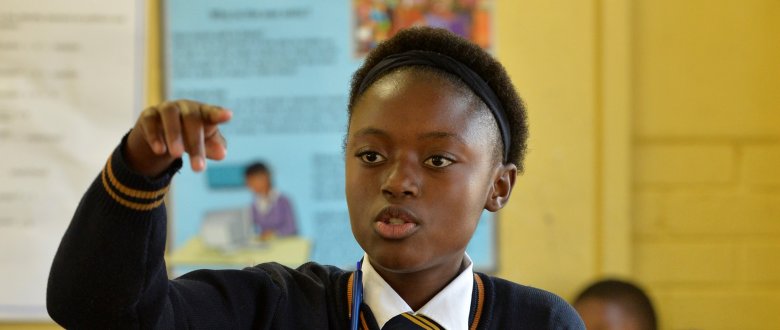
Location: Eastern Cape, KwaZulu-Natal, Limpopo
Timing: 2019-2022
Budget: €1,437,620
Donor: Government of Flanders
Sector: Secondary education
Focus:
-
Climate change education;
-
Professional development of teachers (INSET) and school leaders;
-
Strategic support.
Challenge
South Africa is particularly affected by the consequences of climate change. The observed rate of warming, for instance, has been 2°C per century or even higher – more than twice the global rate of temperature increase. Addressing climate change is a matter of national concern and (political) urgency.
The role of education in addressing the challenges of climate change is increasingly recognised. It provides children and young people with the knowledge and skills to make informed decisions about how to adapt individual lives and ecological, social or economic systems to a changing environment.
But unfortunately, there are two key challenges standing in the way of effectively implementing climate change education in South African schools:
- a fragmentation of climate change knowledge and education at all policy levels;
- a lack of alignment of climate change education with new science and policy directions.
Goal
Teachers and school leaders of secondary schools make climate change education part of school and classroom practice.
Partners
- GreenMatter
- South African government, through:
- Department of Environmental Affairs
- Department of Basic Education
- Department of Higher Education and Training
- Universities involved with Fundisa for Change.
Approach
Keep It Cool creates a coherent policy environment in which the education sector is fully utilised as a strategic resource in South Africa’s transition towards a more climate resilient society.
The project is built around 4 main pillars:
- Addressing climate change education (CCE) in education policy, guidelines and materials;
- Overcoming the fragmentation of knowledge, policy and practice of CCE between key actors;
- Implementing innovative, curriculum-aligned CCE projects, involving students and communities;
- Collecting data on teacher professional development and implemented CCE projects for dissemination.
The project also includes a communication strategy that promotes the exchange of knowledge and promising practices among the stakeholders involved and raises awareness and creates support for CCE and for the project beyond its immediate scope.
At the end of Keep It Cool…
- Key policy actors at local and national level have deepened knowledge about CCE and strengthened capacity to effectively integrate CCE in their policies and guidelines.
- Teachers and professional development providers have access to user-friendly and open resources on CCE.
- Professional development providers develop and organise training sessions on CCE for secondary teachers, and further coach, follow-up and inspire trained teachers in professional learning communities.
- School leaders partake in their own professional learning communities to make sure teachers can optimally take up their role in CCE in a conducive environment.
In parallel, selected higher education institutions conduct research (through process tracing) on teacher professional development and implemented CCE projects and disseminate findings at national and local levels.
Open Educational Resources
The KIC:CCE project has created a variety of resources that can be used by educators, school leaders, teacher trainers and climate change education facilitators to share ideas on how to integrate climate change education and climate action into the curriculum, into the classroom, extra-curricular activities and community projects.
The resources can be accessed and downloaded here.




